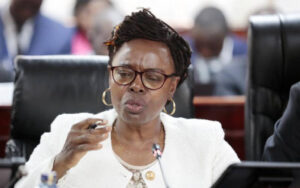Nakuru Governor Susan Kihika’s prolonged absence from her county has brought to the fore the lacuna in law regarding the role of deputy governors in managing county affairs in such a situation.
Governance experts and political analysts have called for the enactment of a sound legal framework to provide for the management of county governments in the absence of a governor.
Such a legal mechanism, the experts say, should provide for the maximum number of days a governor should be absent from office, beyond which the deputy governor should be sworn in acting capacity.
The law, they say, should also require the governors to notify their respective county assemblies about their absence from office.
Meru Senator Murungi Kathuri has tabled a Bill in the Senate seeking to have the House define the roles of deputy governors to ensure they are involved in the administration of the devolved units.
The proposed legislation also seeks to provide clear responsibilities for deputy governors and ensure that they are not sidelined in leadership and decision-making.
The Bill requires governors to allocate their deputies specific duties and also allows them to represent the governors in various national and county government functions.
Kihika’s long absence from office is not the first case of missing county chiefs that has raised questions about absentee leaders.
There was also the case of West Pokot Deputy Governor Nicholas Atudonyang, who reportedly went missing for four years.
After the 2017 general election, Dr Atudonyang, who deputized John Lonyangapuo on a Kanu ticket, disappeared from the county soon after their election.
He returned to the US where he worked as a neurosurgeon, leading to criticism from residents of West Pokot and leaders.
Prof Lonyangapuo, however, defended his deputy’s decision to work for the county while based in the US. He went to the extent of appearing before the Senate and the Ethics and Anti-Corruption Commission (EACC) to defend himself for allowing his principal assistant to work and live in the US as he was lobying for some medical equipment from the country.
“After the equipment arrived, he prolonged his stay, so I told him now we can no longer have any reason to explain to anybody in West Pokot why you should continue being paid. Then he said his salary should be terminated,” Lonyangapuo told the Senate in 2019.
This was, however, before Lonyangapuo’s patience ran out in June 2020.
Stay informed. Subscribe to our newsletter
He surprisingly accused Atudonyang of working with some political leaders from the county to undermine his administration from his base in the US.
This and Kihika’s long absence from office exposed the gaps in law on the management of county affairs.
Although Kihika’s deputy David Kones came out to defend his boss’s absence, governance experts and analysts see it differently.
Joseph Omondi, a governance expert, says that such a legal mechanism would be in consonance with the principles and objectives of the devolved governments as provided by the Constitution “and which is to enhance accountability and transparency in the conduct of public affairs.”
“I think it would have been proper for Governor Kihika to formally hand over power to her deputy as she coped with her private affairs,” Omondi added.
Omondi said there was a need to re-look at the country’s legal framework to address the gaps regarding the management of county governments and, especially, when the governor is out of office for a prolonged period.
“Nobody is opposed to the governor taking maternity leave or travelling out of the country for personal business, but there must be legal mechanism to ensure service delivery at the county is not disrupted or stalled,” Omondi said.
Kihika left the country in November last year and travelled to the US only for her office to later issue a public statement saying she was on maternity leave following intense social media debate about her absence.
“Following numerous calls I have received regarding my absence as elected governor, I want to assure the people of Nakuru that I am well and currently on maternity leave,” the statement issued by Peter Ketyenya, the governor’s chief of staff, quoted Kihika.
Andrew Nyabuto, a political analyst, says there is an urgent need to enact a law providing for the duration of time in which a governor can be away and the procedure for appointing the deputy governor as acting county boss.
“Kenyans can still remember the situation in Nyeri County where the inaugural governor Nderitu Gachagua would travel to the UK for medical purposes and leave the county government in the hands of political cartels who looted public coffers,” Nyabuto said.
Julius Kariuki, a resident in Nakuru, says proper legal mechanisms need to be put in place to regulate the conduct of county governors as county assemblies have failed in their oversight role.
“The Nakuru County Assembly, which is the supreme oversight organ in the county, is unable to demand for explanation from the governor about her prolonged absence and how decisions are being made,” Dr Kariuki said.
Harold Kipchumba, a former senator, says it defeats logic for the electorate to vote in a deputy governor who is later sidelined by the governor when it comes to the running of the affairs of the devolved unit.
“We need properly formulated public service code and laws that guide the exercise of power in all State organs to ensure individuals do not cling to power even when they are away from office attending to personal issues,” Kipchumba said.
Geoffrey Mwangi, the former National Health Insurance Fund Chief Executive officer turned politician, argues that selfish leaders were making it difficult for institutions within county governments operate smoothly.
“It is the height of folly for a governor to leave office and travel to the US for months and continue exercising authority over the county government,” Mwangi said.

























